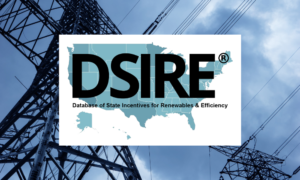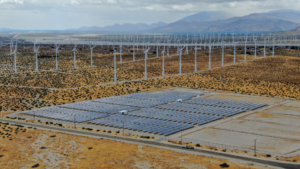35 Years of NCCETC: Navigating the Nation’s Clean Energy Policy Landscape
 The North Carolina Clean Energy Technology Center (NCCETC) at NC State University is celebrating its 35th Anniversary throughout 2023. Previously, we took a deep dive into the history of NCCETC’s policy team, detailing their unwavering commitment to advance a sustainable energy economy through objective research and analysis in addition to providing education and technical assistance on energy policy issues across the United States.
The North Carolina Clean Energy Technology Center (NCCETC) at NC State University is celebrating its 35th Anniversary throughout 2023. Previously, we took a deep dive into the history of NCCETC’s policy team, detailing their unwavering commitment to advance a sustainable energy economy through objective research and analysis in addition to providing education and technical assistance on energy policy issues across the United States.
NCCETC was first founded in December 1987 as the North Carolina Solar Center and has grown into a respected state agency with a mission to advance a sustainable energy economy by educating, demonstrating and providing support for clean energy technologies, practices and policies.
 Energy policy encompasses laws, regulations, judicial opinions, incentives and strategic objectives at the federal, regional, state, local and utility levels. These policies have significant influence over the clean energy technology market, shaping demand, market access and compensation. Well-crafted policies have the power to expedite the deployment of clean energy, but restrictive or slow policy developments could impede the transition to renewables.
Energy policy encompasses laws, regulations, judicial opinions, incentives and strategic objectives at the federal, regional, state, local and utility levels. These policies have significant influence over the clean energy technology market, shaping demand, market access and compensation. Well-crafted policies have the power to expedite the deployment of clean energy, but restrictive or slow policy developments could impede the transition to renewables.
The federal government, all 50 state governments, and local governments share the power to regulate the electric utility industry and ultimately dictate the marketplace for renewable energy in the United States. This means that the nation’s policy landscape is ever-evolving, making it difficult to understand without spending hours pouring through legislation and regulatory dockets.
Enter NCCETC’s Policy & Markets program. Here, our team plays a crucial role in demystifying this complex arena. Our staff supplies vital information on state regulations, tax policies, and a wealth of additional resources aimed at empowering individuals and businesses delving into clean energy and energy efficiency.
The Database of State Incentives for Renewables and Efficiency
 NCCETC was awarded a contract from the U.S. Department of Energy (DOE) in 1995 to build a database of state incentives for renewable energy. Over the last few decades, this project developed into the Database of State Incentives for Renewables and Efficiency (DSIRE) and is recognized as the most comprehensive source of information on clean energy related policies and incentives in the United States.
NCCETC was awarded a contract from the U.S. Department of Energy (DOE) in 1995 to build a database of state incentives for renewable energy. Over the last few decades, this project developed into the Database of State Incentives for Renewables and Efficiency (DSIRE) and is recognized as the most comprehensive source of information on clean energy related policies and incentives in the United States.
“DSIRE is a great resource for homeowners, businesses, the clean energy industry as a whole, utilities, policy makers, and anyone else navigating US energy policy,” said Brian Lips who manages DSIRE and is a Senior Policy Project Coordinator for NCCETC.
DSIRE currently includes summaries for more than 2,400 incentives and policies related to renewable energy, energy efficiency, energy storage, electric vehicles and more. The staff behind DSIRE is constantly working to keep the database up-to-date with the latest policy changes. “In the first half of 2023, we updated over 800 policies and incentives on DSIRE,” Lips said.
Lips noted that both the Inflation Reduction Act (IRA) of 2022 and the National Electric Vehicle Infrastructure (NEVI) Program have caused a flurry of legislative activity. “DSIRE staff are keeping up with the tax incentives modified or established by the IRA,” he stated. “And we’re also going to be incorporating the many state-level rebate programs distributing funds from the NEVI program.”
Individuals who visit DSIRE online are also able to access resources from EnergySage, an online comparison shopping marketplace for solar. DSIRE first partnered with EnergySage in 2017 to offer its full set of tools directly on dsireusa.org, including the ability to request free quotes from its network of installers. Since the collaboration began, over 40,000 requests for a quote have been made and over 3,000 homeowners have used the service to select a solar installer.
Customized Research and Analysis
The policy team at NCCETC also provides customized policy research and analysis services in addition to maintaining DSIRE. Our staff specializes in dissecting energy policy issues, providing insights like comparative state policy breakdowns, real-time tracking of pending legislation, and cutting-edge market research. These invaluable services cater to a wide audience, from clean energy entrepreneurs and investors to advocates, utilities, policymakers, and dedicated researchers.
 Lately, one major focus of the team’s consulting work has been solar energy and the policies and incentive programs prevalent in varying markets across the country. In a recent collaboration, the policy team partnered with a solar developer to conduct a comprehensive analysis of market opportunities for small utility-scale solar development. “Based on the client’s unique business model and objectives, we identified key states that aligned with their requirements, unveiling a new state market with optimal potential,” explained Lips.
Lately, one major focus of the team’s consulting work has been solar energy and the policies and incentive programs prevalent in varying markets across the country. In a recent collaboration, the policy team partnered with a solar developer to conduct a comprehensive analysis of market opportunities for small utility-scale solar development. “Based on the client’s unique business model and objectives, we identified key states that aligned with their requirements, unveiling a new state market with optimal potential,” explained Lips.
In the constantly changing landscape of clean energy, decoding policies is essential for businesses looking towards the promising opportunities and benefits of clean energy while steering clear of potential roadblocks. The resources and expertise provided by NCCETC’s policy team serve as a bridge connecting businesses with the means to champion renewable energy adoption. As we journey forward, NCCETC remains committed to expanding DSIRE and enhancing the suite of services provided by our policy experts to ensure that industry pioneers are equipped with the latest insights, empowering them to forge a path towards a cleaner, more sustainable energy future.